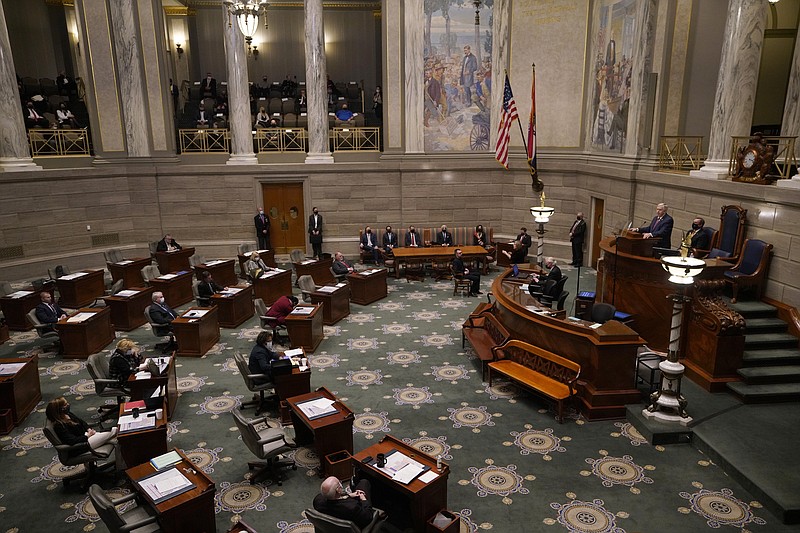A push to provide greater oversight over local health orders and ban vaccine passports was renewed this week when the Missouri Senate tacked both proposals onto a sprawling bill on local government issues.
House Bill 271 swelled from just three pages when it was originally introduced to 101 on Tuesday afternoon, after nearly 30 amendments were added on the Senate floor. Sponsored by House Speaker Pro Tem John Wiemann, R-O'Fallon, the bill was originally intended to establish a database to track local government expenditures.
The bill was passed out of the Senate on Wednesday morning with an emergency clause by a vote of 25 in favor to six against. It now heads back to the House, which can sign off on the Senate's version and send it to the governor or ask for a conference committee to work out a compromise.
More than a year into the novel coronavirus' spread, curbing local health departments' authority and banning vaccine passports have become flashpoints for lawmakers across the country.
Sen. Bob Onder, R-Lake St. Louis, on Tuesday offered an amendment that was essentially a scaled down version of Senate Bill 12, which had failed to gain initial approval after nearly eight hours of debate in late March.
The proposal adopted Tuesday would cap restrictions issued during a state of emergency at 30 days in a 180-day period. Extensions for an additional 30 days could be approved by a simple majority vote of the local health authority's governing body after a report is provided outlining the need for such an extension.
Under the bill, if health orders are issued outside of a state of emergency, they would be limited to 21 days in a 180-day period and require a two-thirds majority vote to be extended. Local governing bodies would also have the authority to terminate any health order by a simple majority vote. Local public health departments under multiple counties would require approval from the governing body in each county.
Senate Bill 12 had previously restricted health orders to a period of 15 days and only permitted their extension for an additional cumulative total of 30 days.
"This particular amendment embodies a compromise that I think most everyone would agree with," Onder said on the Senate floor Tuesday, "which is, that in our Democratic republic, there should always be accountability, ultimately to the people through their elected officials."
Supporters have said such bills would return oversight to elected local governing boards, therefore ensuring residents have a say in health orders. Meanwhile, opponents have warned severe restrictions may hamper health officials' ability to quickly respond in future pandemics.
A similar proposal sponsored by Rep. Jim Murphy, R-St. Louis, passed out of a Senate committee late last month and awaits debate before the Senate. In a letter to Gov. Mike Parson on Tuesday, Murphy and nearly 80 lawmakers urged Parson to lift any remaining health restrictions, noting states like Texas have lifted mask mandates and occupancy limits on businesses.
Amid the pandemic, Gov. Greg Abbott's statewide executive orders in Texas usurped local officials' and often prohibited them from issuing restrictions stricter than those at a state level.
"We hope that our legislation will cross the finish line to your desk but with the uncertainty of the legislative process we feel it is time that immediate action be taken," the letter read. "We ask that you as the leader of this state give our citizens their freedoms back by removing the remaining restrictions imposed on them."
While Parson extended Missouri's state of emergency through Aug. 31, 2021, which kept certain waivers to respond to the pandemic in place, Missouri is not under statewide restrictions, like a mask mandate.
Parson declared Missouri "fully open for business" in mid-June and let the state's social distancing order, which included limits on large gatherings and capacity for some businesses, expire. Over the course of the pandemic, Parson has left such decisions largely in the hands of local officials.
Under another provision of House Bill 271, local jurisdictions would be prohibited from requiring residents provide proof of receiving a COVID-19 vaccine in order to access transportation or public accommodations.
"I believe that any public entity should not be doing that," said Sen. Mike Moon, R-Ash Grove, who amended the language onto the bill Tuesday.
Onder added a provision to limit Moon's amendment to apply only to proof of COVID-19 vaccinations, noting more narrowly tailored language would likely have better chances of surviving the House and conference committee process, where the House and Senate work to come to a compromise on a bill's language.
Moon also originally offered an amendment that would only apply to counties, cities, towns or villages, but later added in "receiving public funds."
The provision had raised concerns for Democratic Sens. John Rizzo, of Independence, and Jill Schupp, of Creve Coeur, who worried it may apply to hotels that have received tax credits or the airline industry that's received federal aid.
"Private businesses should be able to dictate what they do and don't do. If they're taking public funds though, they may be in another category, and I think they probably are," Moon said, later adding: "But if you're a government entity, I think that's what this is primarily aimed toward."
Similar provisions banning vaccine passports are also moving through the process, with a Senate bill barring them to access transportation and a House bill that would go further and extend that ban to private businesses and government entities.
Parson has said that while he would not mandate vaccine passports at a state level, he would be fine with them being used in the private sector.
The Missouri Independent is a nonprofit, nonpartisan news organization covering state government and its impact on Missourians.

